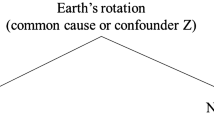Abstract
Many of the decisions we make, in trivial as well as in crucial matters, depend on the apparent likelihood of events such as the keeping of a promise, the success of an enterprise, or the response to an action. In general, we do not have adequate formal models to compute the probabilities of such events. Consequently, most evaluations of likelihood are subjective and intuitive. The manner in which people evaluate evidence to assess probabilities has aroused much research interest in recent years, e.g. Edwards (1968), Slovic (1972), Slovic, Fischhoff, and Lichtenstein (1975), Kahneman and Tversky (1973), and Tversky and Kahneman (1974). This research has identified different heuristics of intuitive thinking and uncovered characteristic errors and biases associated with them. The present paper is concerned with the role of causal thinking in the evaluation of evidence and in the judgment of probability.
Access this chapter
Tax calculation will be finalised at checkout
Purchases are for personal use only
Preview
Unable to display preview. Download preview PDF.
Similar content being viewed by others
Bibliography
Bar-Hillel, M., ‘The Base-rate Fallacy in Subjective Judgments of Probability’, Unpublished doctoral dissertation, Hebrew University, 1975.
Borgida, E. and Nisbett, R. E., ‘Abstract vs Concrete Information: The Senses Engulf the Mind, Unpublished manuscript, 1976, University of Michigan.
Darley, J. M. and Latané, B., ‘Bystander Intervention in Emergencies: Diffusion of Responsibility’, Journal of Personality and Social Psychology 8 (1968), 377–383.
DeFinetti, B., ‘La prévision: ses lois logiques, ses sources subjectives’, Ann. Inst. H. Poincaré 7 (1937), 1–68. Translated into English in H. E. Kyburg, Jr. and H. E. Smokier (eds.) Studies in Subjective Probability, Wiley, New York, 1964, pp. 93–158.
Edwards, W., ‘Conservatism in Human Information Processing’, in B. Kleinmuntz (ed.), Formal Representation of Human Judgment, Wiley, New York, 1968, pp. 17–52.
Hammerton, M., ‘A Case of Radical Probability Estimation’, Journal of Experimental Psychology 101 (1973), 242–254.
Kahneman, D. and Tversky, A., ‘Subjective Probability: A Judgment of Representativeness’, Cognitive Psychology 3 (1972), 430–454.
Kahneman, D. and Tversky, A., ‘On the Psychology of Prediction’, Psychological Review 80 (1973), 237–251.
Lyon, D. and Slovic, P., ‘Dominance of Accuracy Information and Neglect of Base Rates in Probability Estimation’, Acta Psychologica 40 (1976), 287–298.
Nisbett, R. E. and Borgida, E., ‘Attribution and the Psychology of Prediction’, Journal of Personality and Social Psychology 32 (1975), 932–943.
Salmon, W. C., ‘Confirmation and Relevance’, in G. Maxwell and R. M. Anderson, Jr. (eds.), Induction, Probability, and Confirmation, University of Minnesota Press, Minneapolis 1975.
Savage, L. J., The Foundations of Statistics, Wiley, New York, 1954.
Slovic, P., ‘From Shakespeare to Simon: Speculations-and Some Evidence-about Man’s Ability to Process Information’, ORI Research Monograph 12 (1972), 2, Oregon Research Institute.
Slovic, P., Fischhoff, B., and Lichtenstein, S., ‘Cognitive Processes and Societal Risk Taking’, in J. S. Carroll and J. W. Payne (eds.), Cognition and Social Behavior, Lawrence Erlbaum Associates, Potomac, Md., 1976.
Turoff, M., ‘An Alternative Approach to Cross-impact Analysis’, Technological Forecasting and Social Change 3 (1972), 309–339.
Tversky, A. and Kahneman, D., ‘Belief in the Law of Small Numbers’, Psychological Bulletin 76 (1971), 105–110.
Tversky, A. and Kahneman, D., ‘Availability: A Heuristic for Judging Frequency and Probability’, Cognitive Psychology 5 (1973), 207–232.
Tversky, A. and Kahneman, D., ‘Judgment under Uncertainty: Heuristics and Biases’, Science 185, (1974), 1124–1131.
Author information
Authors and Affiliations
Editor information
Editors and Affiliations
Rights and permissions
Copyright information
© 1977 Springer Science+Business Media Dordrecht
About this chapter
Cite this chapter
Tversky, A., Kahneman, D. (1977). Causal Thinking in Judgment under Uncertainty. In: Butts, R.E., Hintikka, J. (eds) Basic Problems in Methodology and Linguistics. The University of Western Ontario Series in Philosophy of Science, vol 11. Springer, Dordrecht. https://doi.org/10.1007/978-94-017-0837-1_11
Download citation
DOI: https://doi.org/10.1007/978-94-017-0837-1_11
Publisher Name: Springer, Dordrecht
Print ISBN: 978-90-481-8350-0
Online ISBN: 978-94-017-0837-1
eBook Packages: Springer Book Archive




